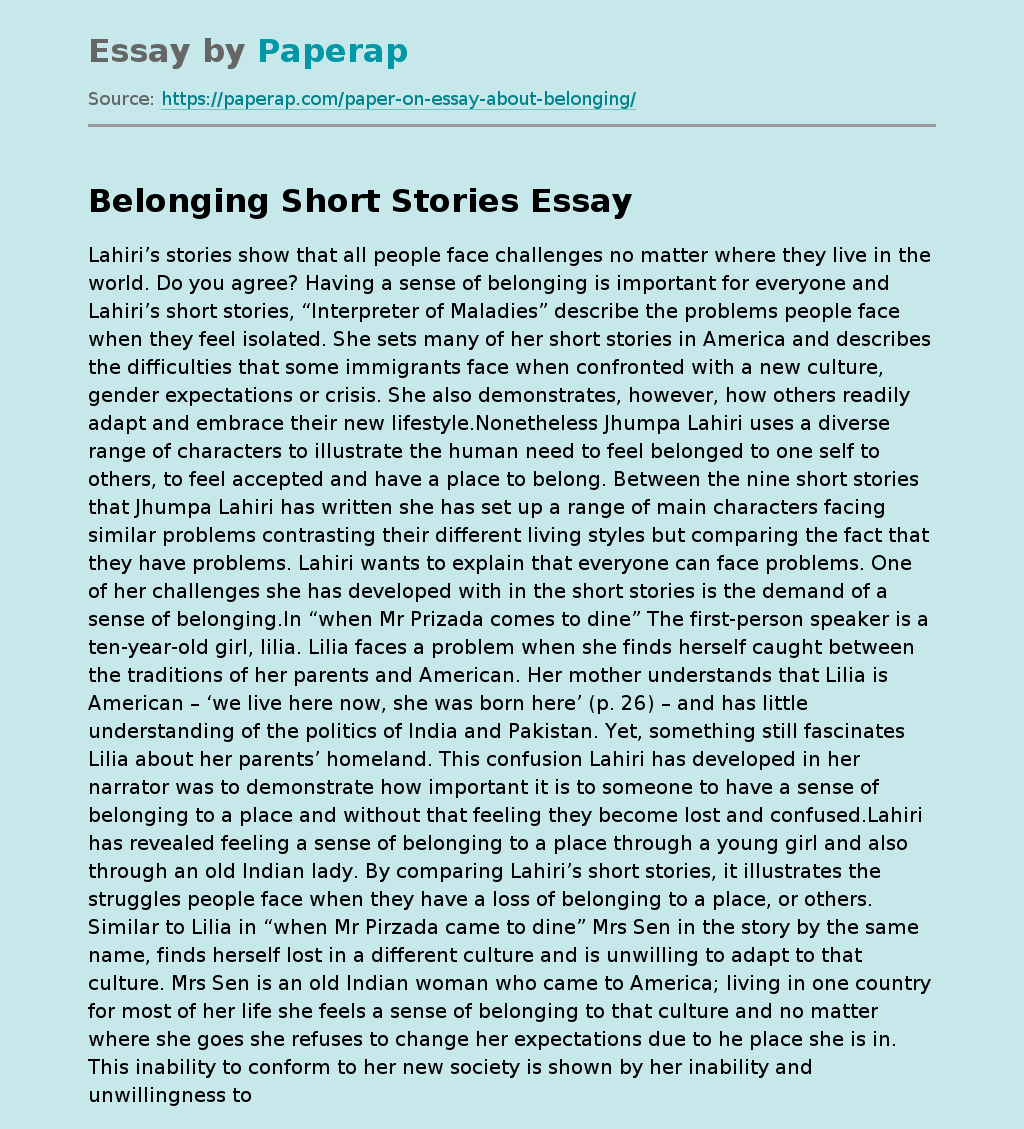Belonging Short Stories
Lahiri’s stories show that all people face challenges no matter where they live in the world. Do you agree? Having a sense of belonging is important for everyone and Lahiri’s short stories, “Interpreter of Maladies” describe the problems people face when they feel isolated. She sets many of her short stories in America and describes the difficulties that some immigrants face when confronted with a new culture, gender expectations or crisis. She also demonstrates, however, how others readily adapt and embrace their new lifestyle.
Nonetheless Jhumpa Lahiri uses a diverse range of characters to illustrate the human need to feel belonged to one self to others, to feel accepted and have a place to belong. Between the nine short stories that Jhumpa Lahiri has written she has set up a range of main characters facing similar problems contrasting their different living styles but comparing the fact that they have problems. Lahiri wants to explain that everyone can face problems.
One of her challenges she has developed with in the short stories is the demand of a sense of belonging.In “when Mr Prizada comes to dine” The first-person speaker is a ten-year-old girl, lilia. Lilia faces a problem when she finds herself caught between the traditions of her parents and American. Her mother understands that Lilia is American – ‘we live here now, she was born here’ (p. 26) – and has little understanding of the politics of India and Pakistan. Yet, something still fascinates Lilia about her parents’ homeland. This confusion Lahiri has developed in her narrator was to demonstrate how important it is to someone to have a sense of belonging to a place and without that feeling they become lost and confused.
Lahiri has revealed feeling a sense of belonging to a place through a young girl and also through an old Indian lady. By comparing Lahiri’s short stories, it illustrates the struggles people face when they have a loss of belonging to a place, or others. Similar to Lilia in “when Mr Pirzada came to dine” Mrs Sen in the story by the same name, finds herself lost in a different culture and is unwilling to adapt to that culture. Mrs Sen is an old Indian woman who came to America; living in one country for most of her life she feels a sense of belonging to that culture and no matter where she goes she refuses to change her expectations due to he place she is in. This inability to conform to her new society is shown by her inability and unwillingness to learn how to drive. Her separation from the culture she is living in is shown when she is on a bus with a ‘bloodlined bag’ (p. 132) full of fish and a woman with ‘a crisp white bag from the drugstore’ (p. 132) tells the bus driver. Mrs Sen is living in a world where blood and the real world are ever-present, a distinct contrast with the antiseptic world of America. Lahiri illustrate the same problem of being forced to adapt and change to survive in another culture with another old Indian woman.In a “ real Durwan” Boori ma works in America and wishes to have a sense of belonging with that country and culture which is unlike Mrs Sen who refuses to change. Lahiri wants to demonstrate a similar problem faced with similar characters, but show how different they are in personality in accepting change. Boori ma seeks to find belonging to a place but then is rejected due to the untrusting of another culture. “We shared our coal, gave her a place to sleep, how could she betray us like this. ”P. 81. Boori ma wishes to connect to a culture, to others as well as to a place.Not being accepted in any of those could create a loss of your true identity. Being confused about your identity is a universally human problem people face. Many people try to find a sense of belonging within them. Being confused about your identity is a hard journey to achieve a comfortable and true description of yourself. Lahiri illustrates this tough journey In ‘Sexy’. Miranda tries on a number of identities in her search to feel comfortable within her. She recalls being exploited when she was younger; however, the affair with Dev offers her hope that she can establish a new sense of self. Pressed her face against Dev’s fingers intertwined with hers” p. 94 revealing the extent that Miranda was trying to steal someone else’s identity and not seek her own. Lahiri explores the idea that identity, is something that must be hunted. We gain a sense of identity through family, society and culture. For the culturally displaced, this is a difficult endeavour. The search for identity is universal. Jhumpa Lahiri has created a diverse collection of characters from young to the old and different cultures, to reveal that problems anyone can face are universal. One of the problemsJhumpa Lahiri has created is a universal human desire to belong. Unable to adapt to a different culture or not being accepted, is a tough challenge people face in order to have a sense of belonging. Being tied between two different cultures can spark confusion in where you’re meant to belong. In addition trying to find a sense of belonging within themselves in a problem that faces many characters Jhumpa Lahiri has created. Ultimately Jhumpa Lahiri’s key message is that anyone regardless of their culture, origin, age, or gender can face similar problems, which makes it harder for them to have a sense of belonging.
Belonging Short Stories. (2019, Dec 05). Retrieved from https://paperap.com/paper-on-essay-about-belonging/

